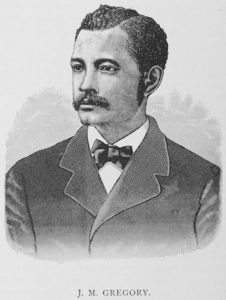
James M. Gregory
*James Gregory was born on this date in 1849. He was a Black Professor, author, and Dean.
James Monroe Gregory was born in Lexington, Virginia, to Maria A. (Gladman) Gregory and Henry L., a local minister. As a child, the family moved to Lynchburg, Virginia. In 1859, they moved to Cleveland, Ohio, where James entered public schools. The family moved to La Porte, Indiana, and then Chicago, where James attended private and public schools, respectively, before returning to Cleveland, where he entered high school.
In 1865, he entered the preparatory department of Oberlin College. Gregory taught at Freedmen's Bureau schools in La Porte, Mt. Tabor, Maryland, and Lynchburg during his summer vacations. One of his teachers in Cleveland was Laura Spelman. General Benjamin F. Butler recommended him for a cadetship at West Point. As his studies ended, President Andrew Johnson refused to appoint him. While still in Ohio, Gregory worked to help escape and free slaves and was secretary of the Fugitives Aid Society in Cleveland, later renamed the Freedmen's Aid Society in Cleveland. While visiting Washington DC to get his appointment papers from Butler, he met General Oliver O. Howard, who was impressed by Gregory and suggested that he (Howard) would like to work with him. Less than a year later, Howard sent a letter to Gregory offering him an instructor position in the preparatory department of Howard University, which Gregory accepted.
When Gregory started at Howard in September 1868, he was the first student in the collegiate department; the course was based on classical studies of New England colleges; he graduated first in a class of three from Howard in 1872. In the winter of the next year, he married Fannie E. Hagan of Williamsport, Pennsylvania, who had earlier been his student. Three years later, he was appointed professor of Latin at the college. In the 1880s, he was made Dean of the collegiate department. He received a master's degree from Harvard University in 1885. In 1881, Gregory began a fight for the right to send his children to public schools in Washington. During the dispute, Gregory, George T. Downing, and Charles Purvis created an organization to fight this discrimination. The group gathered many leading civil rights figures, including Frederick Douglass as president.
The group was supported by representative Dudley C. Haskell of Kansas and succeeded. In 1883, after the Civil Rights Cases saw civil protections for African Americans overturned by the US Supreme Court, Gregory was one of the organizers of mass meetings in protest. He was a leader of the 1883 National Convention of Colored Men in Louisville, Kentucky, where Gregory was elected temporarily. Then, the permanent secretary and fellow DC delegate, Frederick Douglass, was elected president. In 1893, Gregory published a biography of Frederick Douglass entitled Frederick Douglass the Orator.
Gregory was secretary of the Republican Central Committee of the District of Columbia for four years in the 1880s. In 1886, Gregory was appointed to the board of trustees of public schools in Washington, DC, against the vehement protest of the conservative press. The next year was made chairman of the committee on teachers and janitors by the board president. He served on the board for six years. In 1890, Gregory was the founder and president of the American Association of Educators of Colored Youth. He was a delegate to the 1892 Republican National Convention.
In 1891, Gregory was in debt and accused by Daniel Murray and other individuals of inappropriate financial dealings with his students; the charges were dropped. The accusations resurfaced in 1895, and the board removed Gregory as a professor at Howard, although black members opposed the move. Gregory sued Murray for libel related to the case, which Gregory withdrew when Murray retracted the claims he made. In 1897, he became the Bordentown Industrial and Manual Training School principal in Bordentown, New Jersey. The school was based on the methods Booker T. Washington advocated and applied at the Tuskegee Institute. Gregory served until February 1915.
Gregory married Fannie E. Hagan of Williamsport, Pennsylvania, in Williamsport on December 29, 1873. Fannie's mother, Margaret A. Hagen, was born and raised on the property of Judge Roger B. Taney and had been freed by the purchase of her husband. Margaret's mother, Jane, was the daughter of Judge Taney. Margaret's father’s oldest son, Eugene M. Gregory, graduated from Harvard University. One son, Thomas Montgomery Gregory, was a noted dramatist. His great-grandson, through James Francis, was astronaut Frederick Drew Gregory, the first African American to pilot an American spacecraft. Gregory died December 17, 1915, at the home of his daughter in Baltimore, Maryland. His funeral was held at the People's Congregational Church in Washington, DC, and was conducted by Rev. Francis James Grimké. He was buried at Mount Auburn Cemetery in Cambridge, Massachusetts.